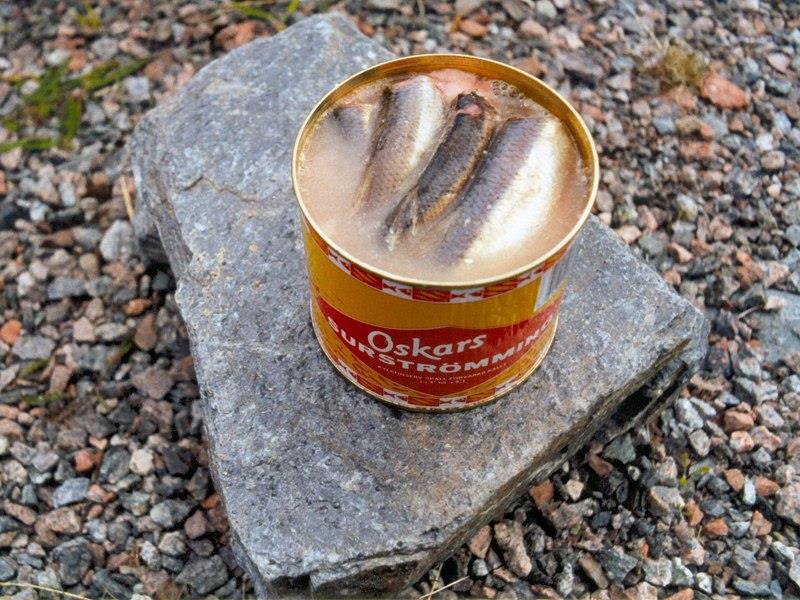
RoRC report - Desktop sailing and food for heroes
by RoRC Andrew Curtain 20 Jun 2021 11:55 UTC

Open can of surströmming © Lapplaender, CC BY-SA 3.0 DE , via Wikimedia Commons
It is hard to imagine a more difficult year. It's a very nasty virus and with international travel upended and restrictions to entry to most countries, plans for cruising are put on hold.
The Scandinavian countries are no exception. At the time of writing it would be impossible to travel between them by yacht let alone from afar and even if arriving by any means from elsewhere in the European Union, 2 weeks quarantine is required. Travel from non-EU countries, now including Britain, at present is not allowed. Things change quickly but a worthwhile site listing the up to date regulations in many countries is that generously provided to the public by the Cruising Association. Membership is recommended.
The result of all this is that many resident in the Baltic region will be spending their summer holidays at home. The Swedish Cruising Club (SKK) predicts a particularly busy time on the coasts with record sales of small boats further adding to the crowds afloat. For those fortunate to be sailing that area, I would advise using the marina advance booking service, Dockspot.
Despite crammed popular areas, I am sure that our Scandinavian members and those of us who keep our yachts there will nevertheless enjoy the many thousands of quiet anchorages that make cruising the area such an experience: social distancing par excellence.
So, we must plan for 2022 and the next report will cover some advice. In the meantime this writer is consoling himself not with what is missed about sailing in this region but about what is not! With local food one of the joys of cruising, there are fond memories of trattoria in Sicily, cheeses in Sardinia, seafood in Galicia and tapas in San Sebastian, but there is a downside. All cultures have survival grub and there are foods for the delicate to avoid.
I have drunk Kava in Samoa (a bit like a muddy Lignocaine solution) and chewed on their disgusting Se-a, (the intestines of a sea cucumber pickled in sea water). Then there is the congealed sea urchin in the Beagle channel. But despite modern Nordic cuisine being both fashionable and excellent, little can match the Scandinavians for food horror: hence this reminiscence.
For hardcore cuisine there is Hákarl, the Icelandic rotten shark which is like eating a rubber eraser with an aftertaste of ammonia, (Google it for precise details) and for a real treat, there is the equine aroma and imagined taste of lamb or fish smoked over horse dung. Norway and Sweden have lutefisk. It is suspected that criticising lutefisk to the Nordic races would be like criticising shamrock to the Irish, so, in fear of causing offence, I leave that to one of their own and quote from Garrison Keillor's book "Pontoon".
"Lutefisk is cod that has been dried in a lye solution. It looks like the desiccated cadavers of squirrels run over by trucks, but after it is soaked and reconstituted and the lye is washed out and it is cooked, it looks more fish-related, though with lutefisk, the window of success is small. It can be tasty, but the statistics aren't on your side. It is the hereditary delicacy of Swedes and Norwegians who serve it around the holidays, in memory of their ancestors, who ate it because they were poor. Most lutefisk is not edible by normal people. It is reminiscent of the afterbirth of a dog or the world's largest chunk of phlegm".
The pièce de résistance has to be Swedish surströmming, voted to be the world's worst smelling food: survival food par excellence. Herring, when stored in the low salinity water of northern Bay of Bothnia ferments. This is not preservation. The fish is tinned with the fermentation process continuing so the tins are distended, pressurised with putrefying gas. They are not allowed on board aircraft. Open tins underwater because the contents spew out under pressure. On asking a local how to safely open a can we were told, "First go to another island". Surströmming is eaten on flat bread with potatoes and onions and as much Aquavit as possible. Although its taste is interesting, it is an olfactory challenge. Do not allow it on board. It might be suitable for those recovering from Covid anosmia.
Right now, writing imprisoned at home, the imagination is far from the above. A remote scene is in thought. Our bows are moored to a rock and the stern anchor is out. We are in the cockpit at 2230, sunset, with that wonderful dusk light of the higher latitudes. No, not surströmming, but memorable northern food: a couple of handfuls of shrimp dipped in aioli, meatballs with those wonderful Swedish potatoes and chanterelles, followed by horseradish flavoured cheese and, if lucky, some cloudberries. Go try it all. It's good for the soul.
My last communication listed several boatyards on the Swedish west coast island of Orust which might be of interest to any looking to winter their yachts in that region. I had a kind message from Clive Scott (OCC, yacht Blue Yonder) who has personal experience of another yard close by and well recommended. Fantasi Yachts are certainly well known for quality work so I am grateful for this inclusion.
Please all be safe with as best a season in the northern hemisphere as possible. If there is any way that I can help with future Baltic cruising plans, do get in touch.
This article has been provided by the courtesy of the Ocean Cruising Club.